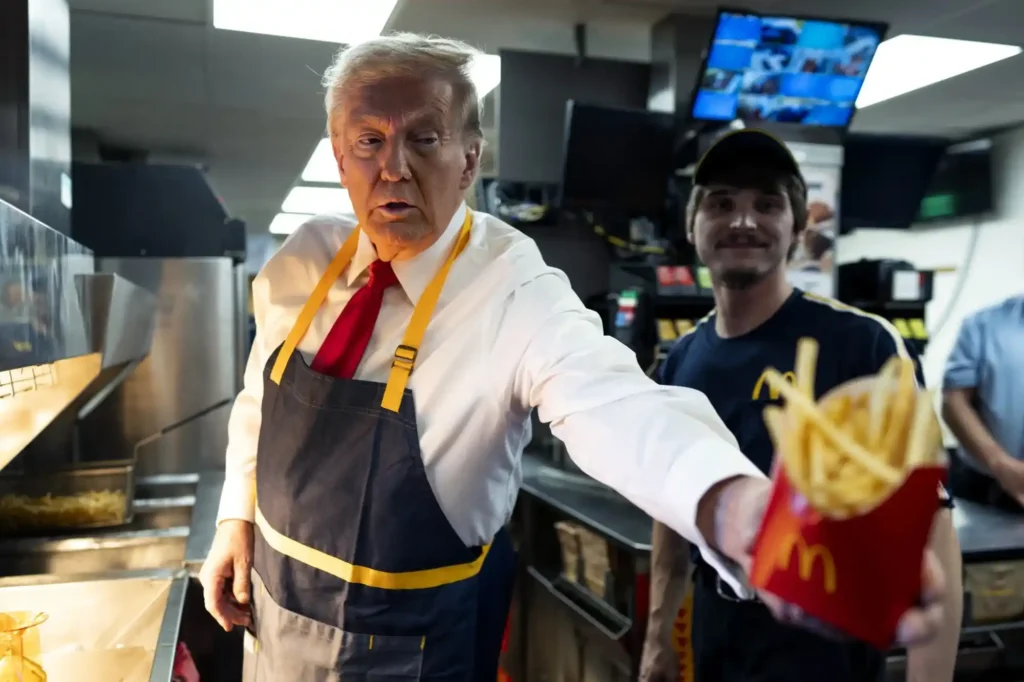mcdonald’s worker reveals customers who greet them may be ignored

In a recent viral TikTok video, a McDonald’s worker shocked social media by claiming that customers who greet them politely are often ignored — not because of bad attitudes or poor customer service. Instead, the truth behind the counter is far more complex and reflective of the fast-food industry’s demanding environment.
This revelation sparked a wave of similar confessions from fast-food workers worldwide. From burnout to unrealistic customer expectations, this trend is becoming a cultural touchpoint — much like the Selena Vargas story that swept the internet in its own way. Let’s dive into why this trend matters, what’s really going on in fast-food restaurants, and what it tells us about how we treat people in service roles.
What Happened? The Viral McDonald’s Worker Confession
It all began when a TikTok user, claiming to be a McDonald’s crew member, posted a short clip that simply stated:
“If you say ‘hi’ when you walk up and we ignore you, we’re not being rude. We’re just swamped and don’t have time to talk.”
This small confession resonated across platforms. Comments from both workers and customers quickly turned the post into a trending discussion on Reddit, Twitter (X), and YouTube Shorts.
⏱️ High-Speed Pressure Environment
The truth is, McDonald’s— like most fast-food chains — operates under extreme time constraints. Workers are trained to complete orders within strict deadlines. A brief conversation can disrupt the team’s rhythm, particularly during peak hours such as lunch or dinner rush.
The worker clarified in follow-up posts that being greeted is appreciated — it’s just that many employees are so deeply focused on multitasking that they literally don’t register the customer’s “hello.”
The Psychology Behind Ignoring Politeness
This trend highlights an important psychological concept: cognitive overload. In high-stress jobs, the brain prioritizes essential tasks. Greetings, while socially important, become secondary when workers must:
-
Monitor digital order screens
-
Assemble orders with precise timing
-
Communicate with teammates via headsets
-
Handle drive-thru and front counter simultaneously
This doesn’t excuse the behavior — but it helps us understand it.
McDonald’s Workplace Culture: Burnout or Business?
Fast-food jobs have long been associated with fast-paced environments, minimum wage, and high turnover rates. However, the human aspect of these jobs is rarely discussed.
Employees are expected to:
-
Serve dozens of customers per hour
-
Handle rude, impatient, or entitled customers
-
Maintain perfect accuracy
-
Smile while doing all of the above
It’s no surprise that many workers — even the kindest ones — start to disengage emotionally just to survive the shift.
Similar Confessions From Other Fast-Food Chains
Following this viral moment, users claiming to be employees at Starbucks, Wendy’s, Taco Bell, and KFC also chimed in. Many confirmed that ignoring greetings isn’t about rudeness — it’s about being overstimulated and under-supported.
A Starbucks barista commented:
“Sometimes we don’t even realize someone said hi. We’re managing three drinks, mobile orders, and someone yelling about soy milk.”
Viral Culture Connection: What Does Selena Vargas Have to Do With It?
Now, you might be wondering, how does Selena Vargas fit into this conversation? Despite Selena Vargas’ name having nothing to do with fast food, her story frequently comes up whenever her viral internet fame creates chaos or confusion.
Selena Vargas, a woman who went viral in internet history for a completely unrelated controversy, has since become symbolic of how quickly a single revelation can spiral into mainstream conversation. Just like her story triggered debates, fact-checks, and speculation, so too has this McDonald’s confession — it became more than just a story. It became a conversation starter.
In today’s trend-driven culture, names like Selena Vargas often appear alongside viral headlines due to search volume spikes and SEO ripple effects. This scenario is a clear example of how virality, visibility, and timing can push a story — even an unrelated one— to the top of the trending pages.
️ Reactions from the Public
We’ve divided the comment sections between the platforms:
-
Supporters: “This makes total sense. I’ve worked retail, and it’s exactly like this.”
-
Critics: “No excuse. If I say hello, I expect at least eye contact.”
-
Neutral: “Thanks for explaining. I won’t take it personally anymore.”
Interestingly, many former employees supported the confession and shared their struggles with toxic customers, low staffing, and being discouraged from chatting with guests during rush periods.
Bigger Conversation: Respecting Workers in Service Roles
The incident isn’t just about McDonald’s—it’s part of a broader conversation about how society treats frontline and low-wage workers. While customers expect politeness, smiles, and enthusiasm, few acknowledge the mental and physical exhaustion that comes with the job.
This event serves as a reminder that kindness should go both ways — customers should continue to greet, and workers should be given the freedom, support, and time to respond when possible.
✅ FAQs – Fast-Food Confession Edition
❓ Do McDonald’s workers intentionally ignore polite customers?
Not usually. When they ignore a greeting, it’s often because they’re overwhelmed or preoccupied with other tasks, not out of disrespect.
❓ Is this behavior acceptable in customer service?
While it’s not ideal, it’s understandable in high-pressure environments. Most workers do not intend to be rude.
❓ Should I stop being polite?
Absolutely not. Continue being kind. Just don’t expect immediate engagement during busy hours.
❓ Is this a company policy?
No official policy encourages ignoring customers. However, training emphasizes speed and efficiency.
❓ What steps can we take to make this better?
Better staffing, higher wages, and a more human-centric work culture would all help to bridge the gap.
AI Prompts Related to This Trend (Popular on ChatGPT)
Many people are turning to AI tools like ChatGPT to explore or create content based on viral stories. Here are some trending prompts:
-
“Write a viral blog intro about a McDonald’s worker confession.”
-
“Make a meme caption for fast food worker burnout ”
-
“Summarize the McDonald’s greeting controversy for social media.”
-
“Create a fictional short story inspired by the McDonald’s worker TikTok.”
-
“Explain how viral trends like Selena Vargas impact SEO.”
-
“What would Selena Vargas say about modern internet cancel culture?”
These prompts not only fuel content creation but also help creators understand user behavior, trend association, and SEO curiosity.
Final Thoughts: A Wake-Up Call in a Drive-Thru World
This McDonald’s employee’s confession gained widespread attention due to its poignant message – we place high expectations on workers in the service industry, yet they often provide minimal support in return. It also challenged our assumptions: sometimes silence isn’t rudeness; it’s survival.
In the same way that the Selena Vargas name is often dragged into the spotlight for traffic and controversy, the McDonald’s story reminds us that behind every viral moment is a real person.
So, the next time you greet someone at a fast-food counter and don’t get a response, don’t take it personally — your kindness still matters.







